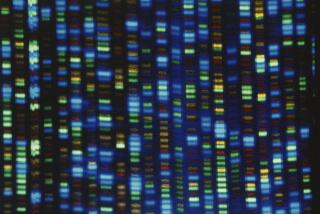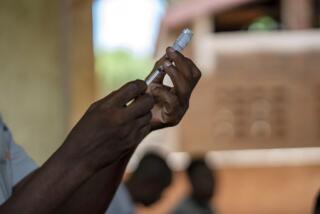NIH to launch Ebola vaccine trials in humans
- Share via
The National Institutes of Health has announced the first clinical trial of a vaccine to protect healthy people from infection by the Ebola virus, which is responsible for an estimated 1,550 deaths throughout West Africa.
NIH director Francis Collins on Thursday called the human safety trials, which are to start next week in Bethesda, Md., the latest in a series of the “extraordinary measures to accelerate the pace of vaccine clinical trials” for the public health emergency in Africa.
Dr. Anthony Fauci, director of the National Institute of Allergy and Infectious Diseases, said the effort to demonstrate the safety of a vaccine against the Zaire strain of Ebola circulating in West Africa will be “the first of many” trials aimed at supplying a vaccine to residents of countries where Ebola is endemic and to the healthcare workers traveling there to care for them.
Later clinical trials are to take place in the United Kingdom and, after approval from the relevant authorities, in the West African countries of Gambia and Mali. Also to be tested in planned trials is at least one other vaccine candidate, developed by the Canadian Health Agency and licensed to NewLink Genetics Corp.
For the initial trial, NIAID and the Army’s Medical Research Institute of Infectious Diseases are recruiting 20 volunteers between the ages of 18 and 50 to receive one of two doses of the investigational vaccine and to have their responses to them evaluated nine times over 48 weeks. Initial safety results would be available by the end of 2014, Fauci said.
Because the Food and Drug Administration waived some of its usual requirements to assess the safety of the vaccine before beginning human trials, Fauci said, medical officials want to take “extra-special care that we go slowly in dosing.” The immediate responses of an initial group of three volunteers will evaluated before an additional 17 are accepted into the study, he told reporters.
“I don’t foresee anything that would be a big red flag,” from preclinical trials, Fauci added, noting that pain and redness around the site of injection is typically seen when vaccines of similar design are administered.
The investigational vaccine, developed by the pharmaceutical giant GlaxoSmithKline, contains no infectious Ebola virus material. It is a chimpanzee adenovirus vector vaccine into which two Ebola genes have been inserted. To deliver its genetic payload, the vaccine is designed to enter healthy cells on the back of a chimpanzee cold virus. The genes do not replicate themselves inside the cells, but prompt them to produce a protein to which the body makes an immune response.
The investigational vaccines to be tested will be either monovalent, protecting either against the Ebola virus strain circulating in Sudan or the one currently circulating in West Africa, or bivalent -- protecting against both.
The U.S. Centers for Disease Control and Prevention have also initiated discussions with Nigerian Ministry of Health officials aimed at conducting a similar safety trial of the GlaxoSmithKline vaccine among healthy adults in that country.
Fauci told reporters Thursday that short supplies of the vaccine candidates would not hamper the launch of human trials, as they have with drugs designed to fight the disease in those already infected. “The situation when you get a large pharmaceutical company like GlaxoSmithKline involved in production is not nearly” the same as when a medication emerges from a small biotechnology company, as is the case with the drug ZMapp that has been used in at least six infected patients.
While Fauci underscored the urgency of getting a vaccine that could protect uninfected Africans and international healthcare workers traveling to the sites of the epidemic, he cautioned that, for now, public health measures such as protective garments and routine disinfection, as well as quarantines, will be the mainstay of efforts to stem Ebola’s spread.
“One of the things you don’t want to happen is distributing something that actually makes the situation worse,” Fauci said. He cited an earlier experience in which a proposed vaccine for HIV that “looked great in animals” increased the risk of infection among humans.
“In science, you never know,” Fauci said. “And that’s why we do trials.”







